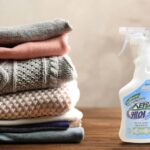Use Antibacterial Detergent
Opt for antibacterial laundry detergents or powders to eliminate harmful bacteria and odor-causing germs. This helps prevent mildew and keeps your clothes fresh, especially during humid or rainy seasons.
Sort Your Laundry
On rainy days, sort your laundry and prioritize washing heavily soiled or wet clothes first. You can leave less dirty and still-dry thicker garments for later.
Mind the Load
Each washing machine has a specified load capacity. For optimal cleaning and to prolong the life of your machine, fill it up to about 70-80% of its maximum capacity. For instance, an 8.5 kg machine should hold around 6-7 kg of laundry per cycle.
Overloading the machine leads to tightly packed clothes, making it difficult for detergent to penetrate and effectively remove stains. This can result in unpleasant odors even after washing.
Space Out Your Clothes
When hanging clothes to dry, avoid crowding them together. Create some space between each item to allow air circulation. This helps speed up the drying process by facilitating the escape of moisture.
Arch-Shaped Drying
Adopt the Japanese method of arch-shaped drying. Hang sturdier, larger items like towels at the outermost ends of the clothesline, and place shorter items like shirts and socks in the center.

Arch-shaped drying (1) expedites the drying process, as practiced by the Japanese.
This method promotes quicker drying due to the increased airflow through the central gap, ensuring your clothes dry faster.
Half-and-Half Hanging
When drying towels, face cloths, or long garments like skirts and pants, try a half-and-half approach. Drape them over the hanger unevenly, with one side shorter than the other, and secure the middle with a clip to prevent slipping.
Electric Fan Assistance
If needed, direct a gentle breeze from an electric fan toward the drying clothes to speed up the process.
Morning Laundry
Wash and hang your clothes early in the morning to maximize drying time during the day when temperatures are higher. Avoid overnight drying, as lower temperatures and increased humidity will slow the process.
Fabric Softener to the Rescue
During rainy weather, use fabric softener to keep your clothes smelling fresh. Some softeners also inhibit bacterial growth, aid in faster drying, and prolong that just-washed scent.
Opt for a Dryer
Using a clothes dryer is an effective way to prevent musty odors during rainy seasons. Scented dryer sheets can also be used to maintain a pleasant fragrance in your laundry.
How Long Should You Soak Your Clothes in Fabric Softener?
Introducing the ultimate guide to fabric softener – a must-read for all those who want to keep their clothes looking and feeling their best! While it’s true that fabric softener can contain chemicals that may impact the fabric and your health over prolonged exposure, there’s no need to fret. With the right knowledge and techniques, you can master the art of using fabric softener safely and effectively. Simply limit the soaking time to 10-15 minutes, and you’re good to go!
9 Foolproof Ways to Wash Your Activewear Without Fear of Fading or Losing Shape
Introducing the ultimate guide to sportswear laundry care: bid farewell to fading colors and misshapen garments. Elevate your laundry game and keep your sportswear looking brand-new with our expert tips and tricks. Learn the secrets to maintaining the quality and vibrancy of your activewear, ensuring they last longer and continue to support your fitness journey.
“Instantly Refresh Your Wardrobe: A Quick Fix for Wrinkled Clothes When You Don’t Own an Iron”
Introducing the ultimate guide to mastering the art of ironing without an iron. Uncover the secrets to achieving crisp and wrinkle-free clothes with these ingenious hacks. Imagine having the power to transform your garments from crumpled to impeccable without the need for a traditional iron. With these simple yet effective techniques, you’ll be empowered to tackle any creases and embrace a polished look, even without the usual equipment. Get ready to impress and exude confidence with smooth and perfectly pressed clothes, achieved through these unconventional yet brilliant methods.





































